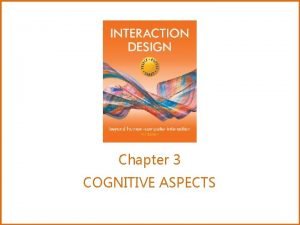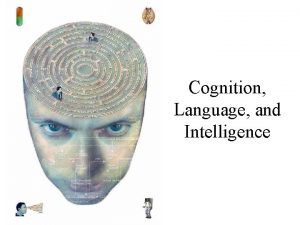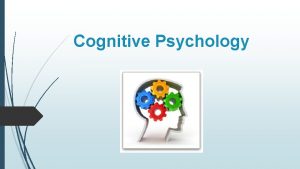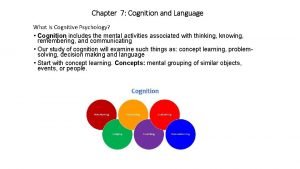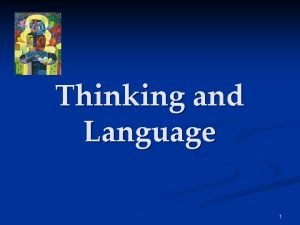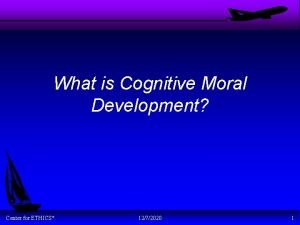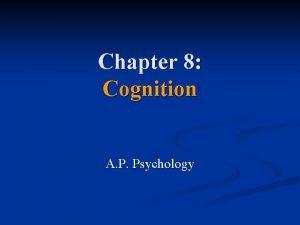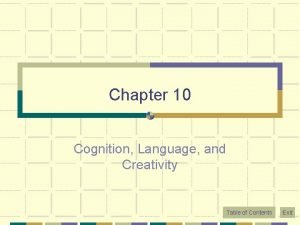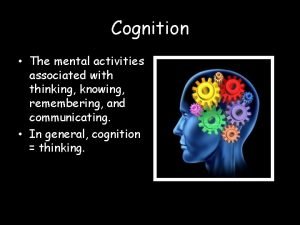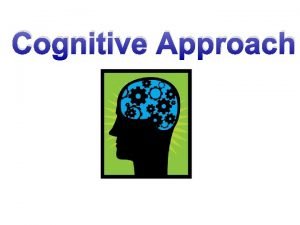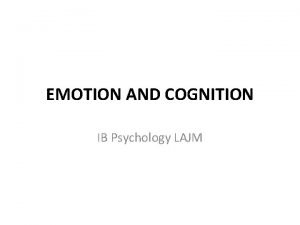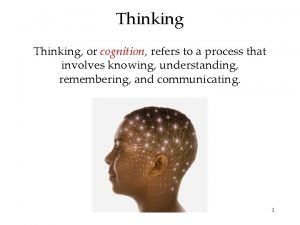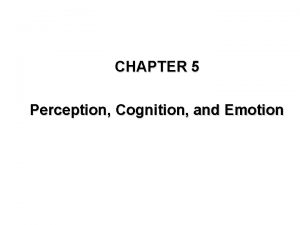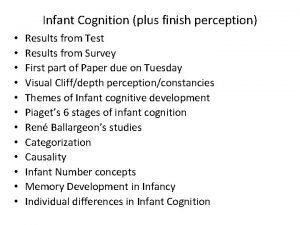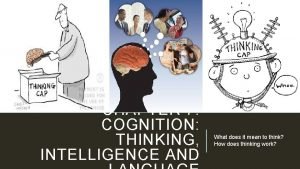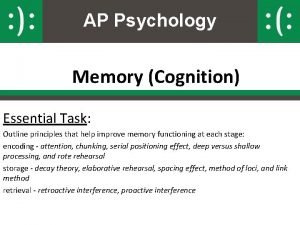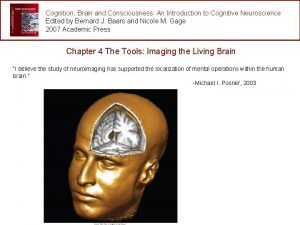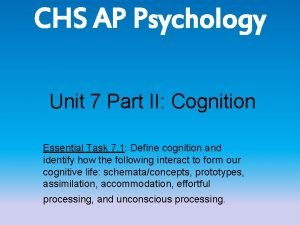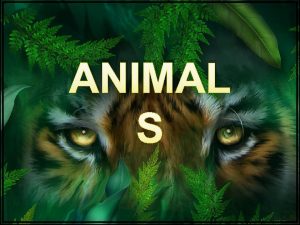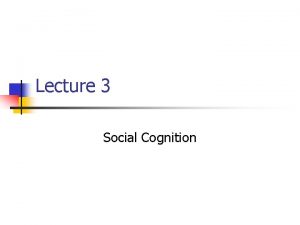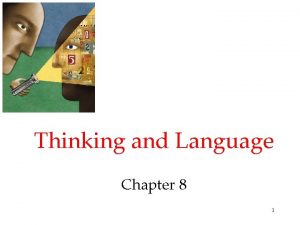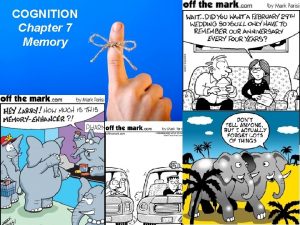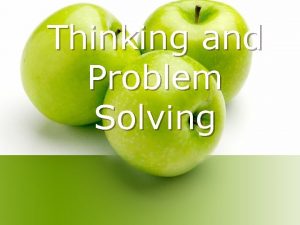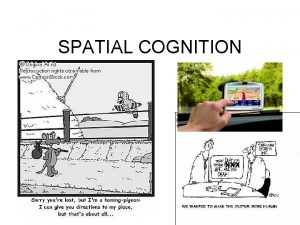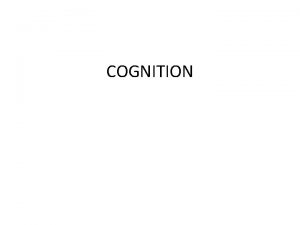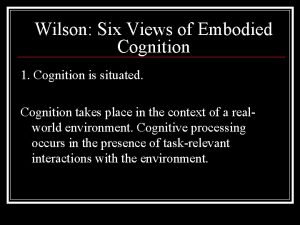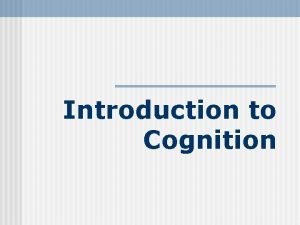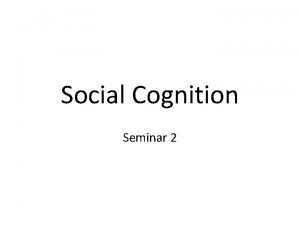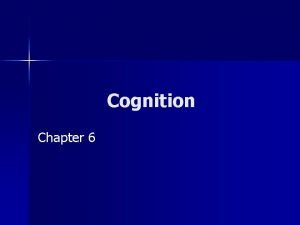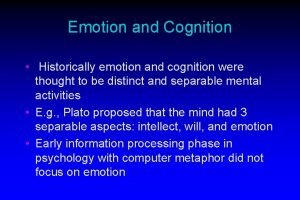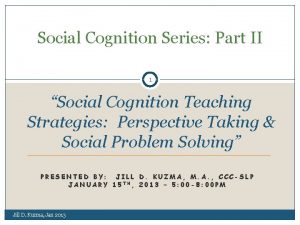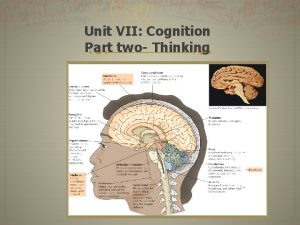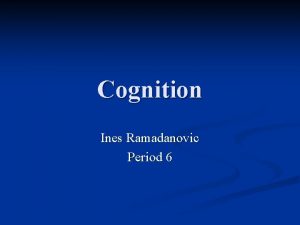Lecture 11 ANIMAL COGNITION What is Animal Cognition






















- Slides: 22

Lecture 11 ANIMAL COGNITION 第十一讲 动物认知

What is Animal Cognition? Animal cognition is the study of the processes used to generate adaptive or flexible behavior in animal species. In the context of animal cognition research, cognition usually refers to the cognitive mechanisms involved in learning, memory, perception, and decision-making. As a part of cognitive science, research in animal cognition aims to uncover the different cognitive mechanisms at play across species, with the purpose of understanding the varieties of cognition, the similarities between humans and other species, and the evolution and function of cognitive processes.

The background assumption for much animal cognition research The computational theory of mind. Is cognition a general purpose computational system? Or is cognition modular? (cognition must be thought of as a bundle of specialpurpose computational modules rather than one general purpose processor)

Animal Minds from the historical perspective : Aristotle: defined “human” as “the rational animal”, thus rejecting the possibility that any other species is rational. Aquinas: believed that animals are irrational because they are not free. Descartes: defended a distinction between humans and animals based on the belief that language is a necessary condition for mind; on his view animals are soulless machines. Kant: concluded that since they cannot think about themselves, animals are not rational agents and hence they only have instrumental value.

Animal Minds from the historical perspective : Voltaire: criticized Descartes' view that humans but not animals have souls and hence minds, by suggesting that there is no evidence for the claim. Hume: was downright dismissive of the animal mind skeptics when he wrote “Next to the ridicule of denying an evident truth, is that of taking much pains to defend it; and no truth appears to me more evident than that beasts are endowed with thought and reason as well as man. The arguments are in this case so obvious, that they never escape the most stupid and ignorant”

Why do animals have minds? The argument from analogy for animal minds : 1. All animals I already know to have a mind (i. e. , humans) have property x. 2. Individuals of species y have property x. 3. Therefore, individual of species y probably have a mind. The reference property (x) could refer to any number of things, such as a general capacity (e. g. problem solving), a specific ability (e. g. language, theory of mind, tool-use), a behavior, or even brain activity (see Farah 2008 for an example of this last approach).

Why do animals have minds? The inference to the best explanation argument: 1. Individuals of species x engage in behaviors y. 2. The best scientific explanation for an individual engaging in behaviors y is that it has a mind. 3. Therefore, it is likely that individuals of species x have minds. The inference to the best explanation argument justifies the attribution of mental states to animals based on the robust predictive and explanatory power that is gained from such attributions. As the argument goes, without such attributions we would be unable to make sense of animal behavior. This argument relies on ordinary scientific reasoning; of two hypotheses, the one that better accounts for the phenomenon is the one to be preferred.

The charge of anthropomorphism (拟人论之反驳) The term “anthropomorphism” has a number of different connotations, but most generally refers to the act of attributing human traits to other animals. The charge of anthropomorphism is a charge that the attributor is making a “category mistake”. That is to say, human traits are conceptually distinct from animal traits, so to attribute the former to animals is conceptually wrong.

Moreover: Some argue that anthropomorphism is a human tendency that must be overcome in order to do good science, because it relies an unjustified generalization from linguistic humans to nonlinguistic animals. These critics suggest that animals who lack language may not even have concepts, and without language scientists are not in a position to attribute content. Since we are barred from making attributions, scientific psychology ought not engage with questions about animal mentality.

Even if there is no categorical prohibition against attributing human properties to animals: Some researchers may be too quick to conclude that an animal is using some “higher-order” process in a particular instance. One concern is that researchers may have a failure of imagination when it comes to hypothesis generation. A false dichotomy: either animals are stimulus-response machines, or they are agents with beliefs and desires; since animals are not stimulus-response machines, they must be psychological agents. The problem with this argument is that not all machines implement stimulus-response functions; some machines are complex and indeterministic, and if animals were machines, they would be machines of that sort.

SOME WORDS ON CULTURAL INFLUENCES: The concerns about anthropomorphism appear to be largely limited to western scientists. It has been argued that researchers from countries with a Buddhist rather than Christian orientation are not culturally encouraged to see a categorical distinction between humans and nonhuman animals. Unlike Christianity, the Buddhist doctrine does not claim that humans, but not animals, have immortal souls, and thus it does not allow humans to use animals for their own purposes in the ways Christianity does.

DO ANIMALS HAVE RATIONALITY? Rationality is sometimes understood in terms of acting for reasons. Given this starting point, Glock argues that animal are rational because they can act in light of reasons understood objectively, in an agent-neutral fashion, and that the animal is sensitive to these reasons (Glock 2009). However, discussions of animal rationality are confounded by the lack of consensus on what is required for rationality.

Some philosophical theories of rationality are based on an initial acceptance of rationality across species, given evolutionary considerations. For example, on Fred Dretske‘s view, even some simple learned behaviors, such as a bird’s avoiding eating a monarch butterfly(君主斑蝶), can be construed as minimally rational. Because monarchs who eat toxic milkweed (有毒乳草 )become toxic to birds and other predators, when a bird learns not to eat monarch butterflies after having formed an association between eating monarchs and vomiting(呕吐), it has a reason for its avoidance behavior. The birds also have a reason to avoid eating a viceroy(大都督蝴蝶), given that it is visually almost indistinguishable from a monarch, though not poisonous. The behavior in both cases is explained by the content of the bird's thought (or “thought”), and for Dretske this is sufficient for the bird to count as a minimally rational agent (1988, 2006). FROM THE PERSPECTIVE OF EVOLUTIONARY PSYCHOLOGY

RATIONALITY AND TOOL USE Tool use in the wild has been discovered in a number of different taxa(类群), including all great apes, some monkeys, some birds, sea otters(海 獭), and cetaceans(鲸类). Reports of animal tool use offer evidence in favor of the claim that some animal behavior is functionally rational, in the sense that its behavior allows the animal to achieve a goal. Furthermore, it is perhaps the result of an evolutionary adaptation. However, the extent to which such evidence addresses the question of whether the behavior is rational in the sense of being in the space of reasons is a matter of debate.

DO ANIMALS HAVE BELIEFS? The question of whether animals have beliefs is also difficult to answer given the lack of theoretical agreement about the nature of belief. The most common view is that belief is arepresentational state, and that the mental representation, which fixes content, expresses propositional content.

Some representationalists have suggested that animals might have representational belief that cannot be expressed propositionally. For example, Camp suggests that some beliefs are based on imagistic representational systems, such as diagrams or maps, and that such systems can account for baboon social knowledge, so there is no need to posit a baboon language of thought (Camp 2009; in response to Cheney & Seyfarth 2007). While Cheney and Seyfarth claim that the baboon (狒狒) cognitive system is vehicled by a language of thought given its nature as representational, discrete-valued, hierarchically structured, rule-governed, open-ended, and independent of sensory modality, Camp argues that the inference is not warranted, since non-sentential representational systems can also have such features. WHAT KIND OF BELIEFS DO ANIMALS HAVE?

Camp, who defends the claim that maps have a rich syntactic structure, admits some limitations: mental maps do not seem to be able to accommodate some first order thoughts such as non-specific existentially quantified propositions or universally quantified propositions, or any second-order thoughts (Camp 2007). Carruthers also argues that, while even insects have beliefs (Carruthers 2004), there is no evidence that any nonhuman species has metacognitive abilities (Carruthers 2008). Carruthers suggests that the evidence from animal behavior supports the position that belief, like desire, comes in degrees (Carruthers 2008). THE LIMITATIONS OF ANIMAL BELIEFS

1. In order for something to have a belief, it must have a concept. 2. In order to have a concept, one must have particular kinds of knowledge, including knowledge of how the concept relates to other concepts. 3. Non-human animals don't have such knowledge. 4. Therefore, non-human animals don't have beliefs. BUT THERE IS AN ARGUMENT AGAINST ANY ATTEMPT TO ATTRIBUTE BELIEFS TO ANIMALS

One of the earliest methods for examining animal concepts came out of a series of experiments with pigeons. The subjects were shown photographs, and were trained to peck at the pictures that contained a target object, such as a tree, and not respond to the pictures that didn't contain the target object. After the training period, the pigeons were able to generalize to new photographs, pecking only at those that contained trees just as in the training set. It was suggested that this sorting ability demonstrates that the pigeon has a concept of the target object (Herrnstein 1979; Herrnstein et al. 1976). DO ANIMALS HAVE CONCEPTS?

Allen presents the general strategy for attributing concepts to animals as follows: “An organism O may reasonably be attributed a concept of X (e. g. TREE) whenever: 1. O systematically discriminates some Xs from some non-Xs; and 2. O is capable of detecting some of its own discrimination errors between Xs and non-Xs; and 3. O is capable of learning to better discriminate Xs from non-Xs as a consequence of its capacity”(Allen 1999, 37). HOW DO WE KNOW THAT ANIMALS HAVE CONCEPTS?

http: //plato. stanford. edu/entries/cognitio n-animal/ FURTHER READING

 01:640:244 lecture notes - lecture 15: plat, idah, farad
01:640:244 lecture notes - lecture 15: plat, idah, farad What is cognition
What is cognition No word
No word What is cognition
What is cognition Jalan pintas mental
Jalan pintas mental Means end analysis psychology example
Means end analysis psychology example Language
Language Moral cognition
Moral cognition Metal status exam
Metal status exam Embodied cognition ap psychology
Embodied cognition ap psychology Cognition definition
Cognition definition All the mental activities associated with thinking
All the mental activities associated with thinking Cognition definition
Cognition definition Emotion and cognition ib psychology
Emotion and cognition ib psychology Example of dissonance
Example of dissonance Cognition vs perception
Cognition vs perception Cognition plus
Cognition plus Cognition thinking intelligence and language
Cognition thinking intelligence and language Cognition mse
Cognition mse Assimilation ap psychology definition
Assimilation ap psychology definition Priming memory examples
Priming memory examples Consciousness
Consciousness Embodied cognition ap psychology definition
Embodied cognition ap psychology definition

